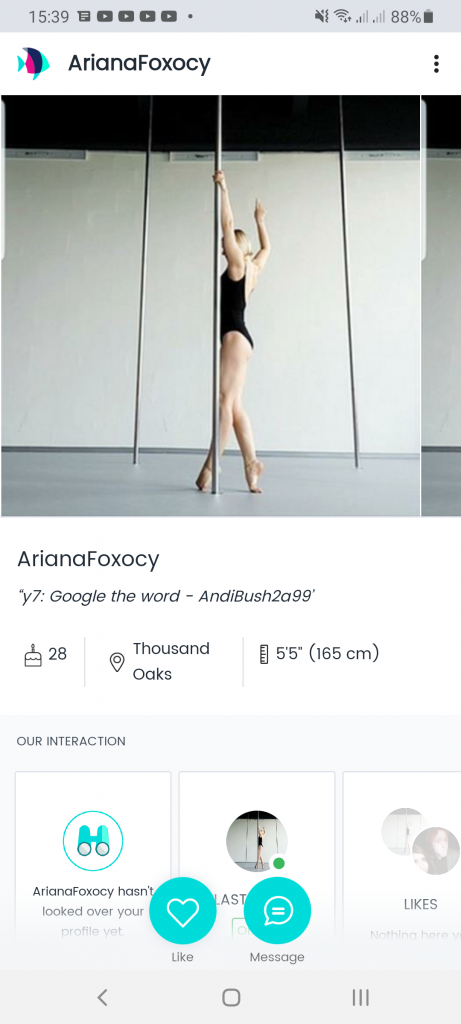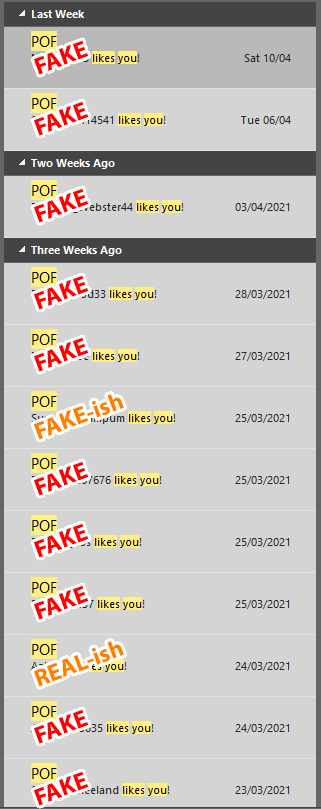Before we begin, let me be clear, I can’t say if all fake accounts are controlled by Match Group, if none of them are, or if some are and some aren’t. If you see a fake account with “visit [URL] to see my nude pictures”, “google [word that will only bring up one result] to see my naked pics”, or “WhatsApp me on +447…”, etc, my personal opinion is that they are not Match Group controlled accounts. I would suggest they are on their own phishing expedition. However, they are incredibly useful for Match Group, which is why Match Group allegedly allows them to exist on all of its platforms, despite how easy it would be to stop them. I am in no way implying that Match Group actively creates and runs fake accounts. The purpose of this post is to explain their alleged usefulness to Match Group. Don’t sue me, Match Group.

We all know that fake accounts are a common thing on dating sites. We’ve all seen dozens of fake accounts on OkCupid, PoF, Tinder, Match.com, etc. If you don’t think you have seen a fake account on any Match Group platform, you haven’t been paying attention. In the Federal Trade Commission’s (FTC) September 2019 court filings against Match Group, the FTC estimated that “as many as 25-30 percent of Match.com members who registered each day” were “using Match.com to perpetrate scams” (i.e. they were either fake/bot accounts on phishing expeditions or real accounts looking to “rinse” other users). From my experience, I would estimate that about that number of PoF members are fake, too, and somewhat less than that on OkCupid. I haven’t used Tinder in a few years, so I cannot comment on how many fake accounts are on that platform nowadays.
Fake accounts hardly ever used to exist on OkCupid. Sure, you might have seen one or two, but the site was mostly populated by genuine people who could prove they were genuine by writing something unique and expansive on their profile. That was until the IAC/Match Group takeover in 2011, or, more specifically, when Christian Rudder stepped down as President of OkCupid in 2015 and his philosophy went out the window (along with all the features). Fake accounts are rampant on the platform now. You can’t go a single swiping session on OkCupid or any Match Group app without seeing a fake account. They may just seem like an annoyance; however, there is a more serious reason for them.
No doubt you’ve received an email from a Match Group intellectual property saying “[user] likes you!” (PoF), “Someone likes you” (OKC), or “[your username], you’ve been noticed” (Match.com). I receive dozens of these a day, and they usually come in soon after I log onto the site or app in question. These emails are all designed to get you to sign up for premium memberships. With the exception of PoF, the emails do not tell you the username of the member who liked/noticed you. To find out that information, you have to give Match Group money. With PoF, even though you can see the username, you cannot search usernames unless you have a premium membership. To make it more egregious, the email contains a link saying “View Their Profile”. This link doesn’t actually take you to their profile, but, instead, takes you to the “Interested in Me” section of the website. Of course, you cannot see this section of the website unless you have a premium membership; without a premium membership, this page just shows an advertisement for premium membership.

And this brings us onto the lawsuit that the FTC filed against Match Group in September 2019. The FTC alleged that Match Group actively used fake accounts in advertisements. That is, Match Group had marked these accounts as being possibly fraudulent, but still sent users emails saying that the account was interested in the recipient. The FTC alleged that this amounted to false advertising because the recipient would not receive the communications (messages, likes, etc) promised by Match Group after the recipient signed up for premium membership as a result of these emails.
Again, these are accounts that Match Group suspected of being fraudulent. So much so that Match Group withheld messages that these accounts sent to premium members, but non-premium members still received email advertisements saying that the account was interested in them. And we’re not talking about a few emails. In a two-year period between June 2016 and May 2018, approximately 4 million of these communications were sent. That’s about 5,000 a day. Match Group’s own analysis found that 499,691 members subscribed to Match.com within 24 hours of receiving advertisements regarding fraudulent accounts in that two-year period.
Now, the FTC’s court filings do not outline how much money was allegedly fraudulently taken from users by Match Group. And working out this figure is difficult because we don’t know which subscription packages users bought (1-, 3-, 6-, or 12-months), what sales were happening when the users subscribed, and where the users were located (since the costs are different in different regions). However, using current UK prices, we can estimate that it is likely between £15 million and £30 million, or between $20 million and $41 million when converted into USD. And, remember, that’s just from fake accounts.
On top of this, the FTC alleges that Match Group’s allowing fake accounts has exposed its users to fraud. The FTC does not put an exact figure on how much fraud; however, they do point out that between 2015 and 2017, losses as a result of all dating scams (not just from Match Group intellectual properties) that were reported to the FTC and FBI amounted to $884 million. And they are keen to point out that the actual figure is likely much higher because this type of fraud is underreported due to its nature (people are often too embarrassed to admit that they were rinsed on a dating site).
And these are just two (false advertising and exposing users to fraud) of the five charges that the FTC brought against Match Group in their suit.
So, the next time you see an obviously fake account on any Match Group intellectual property, just know that you’re probably seeing it because Match Group are allegedly using it in the hope of taking your money.